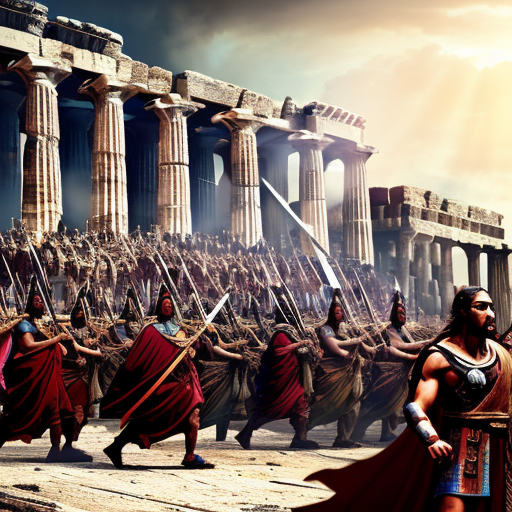The Peloponnesian War: A Clash of Empires
The Peloponnesian War, written by the ancient Greek historian Thucydides, is a comprehensive account of the war between Athens and Sparta that took place from 431 to 404 BCE. This conflict, which lasted for nearly three decades, had a profound impact on the ancient Greek world and is considered one of the most significant events in Western history. Thucydides’ work provides a detailed and insightful analysis of the causes, course, and consequences of the war, shedding light on the nature of power, politics, and human behavior in times of conflict.
The Causes of the War: Power Struggles and Fear
The Peloponnesian War was primarily a result of the power struggle between Athens and Sparta, the two leading city-states in ancient Greece. Athens, with its powerful navy and democratic government, had become the dominant force in the region, while Sparta, with its formidable army and oligarchic regime, sought to maintain its own influence. The growing fear and mistrust between the two states eventually led to open conflict.
Thucydides argues that the true cause of the war was not merely the rivalry between Athens and Sparta, but rather the underlying fear and insecurity that permeated the Greek world. As Athens expanded its empire and exerted its influence over other city-states, many felt threatened and sought alliances with Sparta. The fear of being dominated by Athens and the desire to preserve their own autonomy drove many states to join the Spartan-led Peloponnesian League.
The Course of the War: Strategies, Battles, and Betrayals
Thucydides meticulously chronicles the major events of the war, from the initial clashes between Athens and Sparta to the final surrender of Athens. He provides detailed accounts of the strategies employed by both sides, the key battles fought, and the political maneuvering that took place throughout the conflict.
The war was marked by several significant turning points. The Athenian expedition to Sicily, for example, ended in disaster and severely weakened Athens’ position. The Spartan victory at the Battle of Aegospotami, where they destroyed the Athenian fleet, ultimately led to the fall of Athens and the end of the war.
Throughout the conflict, alliances shifted, betrayals occurred, and both sides committed acts of brutality. Thucydides highlights the moral and ethical dilemmas faced by individuals and states during times of war, as well as the devastating consequences that result from unchecked ambition and the pursuit of power.
The Consequences of the War: A Changed Greek World
The Peloponnesian War had far-reaching consequences for the Greek world. Athens, once the dominant power, was left weakened and humiliated, while Sparta emerged as the new hegemon. However, the war had also taken a toll on Sparta, and its dominance was short-lived.
The war shattered the Greek sense of unity and exposed the deep divisions and rivalries that existed among the city-states. It also led to a decline in the power and influence of Greece as a whole, paving the way for the rise of Macedonia and eventually Alexander the Great.
Thucydides’ account of the war serves as a cautionary tale, highlighting the destructive nature of war and the complex dynamics of power and politics. His analysis of the causes, course, and consequences of the conflict provides valuable insights into human behavior and the fragility of empires.
- The Peloponnesian War was primarily a result of the power struggle between Athens and Sparta.
- The war was fueled by fear and insecurity among the Greek city-states.
- The war had far-reaching consequences, including the decline of Greece as a unified power.
“The strong do what they can, and the weak suffer what they must.”
– Thucydides
The Peloponnesian War is a timeless account of the complexities of war and the consequences of unchecked power. Thucydides’ work continues to be studied and revered for its insights into human nature and the lessons it offers for future generations.












